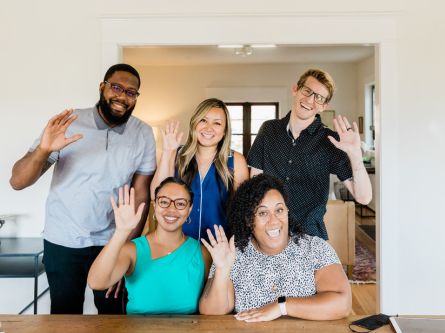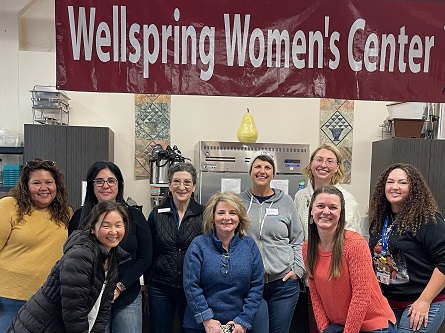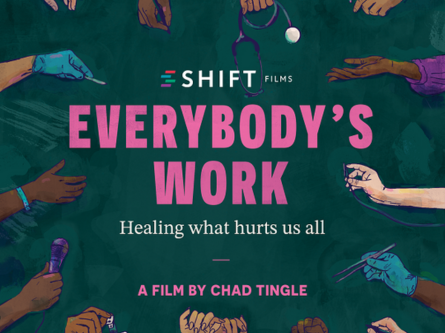By Matthew St. Amant (he/him)
Every year on November 21st, people around the world celebrate World Hello Day, a day dedicated to promoting peace and unity through simple greetings. Saying 'hello' is more than just a word—it's an open door to connection, understanding, and respect across different cultures and languages. At UC Davis Health, this day aligns perfectly with our Principles of Community, which emphasize diversity, inclusion, and respect for all individuals. Let’s explore the beautiful ways people greet each other around the globe and reflect on how these gestures connect us to the heart of our community values.
Saying Hello Around the World
- Japan: In Japan, a polite bow is the customary way to greet someone, expressing respect and humility. The depth of the bow can indicate the level of respect or formality of the greeting.
- France: The French often greet close friends or family with 'la bise,' a light kiss on each cheek. This warm and intimate gesture embodies a sense of familiarity and affection.
- Kenya (Maasai Tribe): Among the Maasai people of Kenya, a friendly greeting often involves a raised hand or even a light touch on the shoulder, accompanied by the word 'supa.' It is a way to acknowledge each other's presence and build community spirit.
- Palestinian: In Palestinian culture, greetings often start with 'Marhaba' (مرحبا), which means hello, or 'Ahlan wa sahlan' (أهلا وسهلا), meaning 'welcome.' These expressions convey hospitality and warmth, reflecting a cultural emphasis on welcoming others with an open heart.
- Thailand: The Thai greeting, known as the 'wai,' involves placing the palms together in a prayer-like gesture and bowing slightly. It's a versatile greeting used to express respect, gratitude, or apology.
- United States: In the U.S., a casual wave or handshake is common. The diversity in greetings reflects the melting pot of cultures that define the nation.
- Arabic: In Arabic-speaking countries, 'مرحبا' (Marhaba) is a common way to say hello. Another popular greeting is 'السلام عليكم' (As-salamu alaykum), which means 'peace be upon you.' This greeting is often used across the Muslim world and reflects a deep cultural emphasis on peace and mutual respect.
- Fijian: In Fiji, 'Bula' is the most common greeting, which goes beyond a simple hello. 'Bula' conveys a wish for good health and happiness, often delivered with a cheerful tone and a smile. This greeting reflects the warmth and friendliness of Fijian culture and is a key part of the country's hospitality and communal spirit.
- Jewish: In Jewish culture, the greeting 'Shalom' (שלום) is used, which means 'peace.' It is used both to say hello and goodbye, reflecting a wish for peace and well-being. This greeting carries a deep cultural and spiritual significance, embodying a universal aspiration for harmony.
- Hindi: In India, 'नमस्ते' (Namaste) or 'नमस्कार' (Namaskar) is a traditional greeting used across many regions. This greeting is often accompanied by a slight bow and hands pressed together in front of the chest, similar to a prayer gesture. It conveys respect and reverence, signifying 'I bow to you,' and is used in both formal and informal settings.
The Power of a Simple Greeting
These unique greetings demonstrate that, while the words or gestures may differ, the intent is universal: to acknowledge, welcome, and show respect to another person. At UC Davis Health, we celebrate these differences as a testament to our commitment to diversity and inclusion.
Our Principles of Community affirm our dedication to creating an environment where everyone feels valued and respected. Just as a simple 'hello' can bridge gaps between people of different backgrounds, our commitment to inclusivity fosters a sense of belonging and community within our institution.
Bringing It Home: Our Principles of Community
- Respect and Affirmation: Just as greetings reflect respect in different cultures, UC Davis Health commits to respecting the dignity and worth of every individual. Every interaction, whether with colleagues, patients, or visitors, is an opportunity to affirm our shared humanity.
- Inclusiveness and Diversity: A variety of greetings represents the diversity of human experience. We embrace this diversity within our workforce and community, fostering an inclusive environment where differences are celebrated.
- Empathy and Compassion: Saying hello is often the first step toward understanding. At UC Davis Health, we go beyond the greeting by showing genuine empathy and compassion to everyone we encounter, supporting a culture of kindness and care.
- Sense of Belonging: At UC Davis Health, we strive to create an environment where every individual feels seen, heard, and valued. By celebrating diverse greetings and cultural practices, we foster a sense of belonging that enhances collaboration, innovation, and trust within our community. We understand that when people feel they truly belong, they are empowered to contribute their best.
- Culturally Aware and Emotionally Intelligent Organization: Our commitment goes beyond just recognizing diversity; it extends to understanding and valuing the cultural contexts and emotional experiences of everyone we serve and work with. By promoting cultural awareness and emotional intelligence, we ensure that UC Davis Health remains a place where all feel respected and cared for, enabling us to deliver exceptional service and care.
Join Us in Celebrating World Hello Day
This World Hello Day, let’s make an extra effort to reach out with a friendly greeting, learn how others around the world say 'hello,' and reflect on how these simple acts can contribute to a more connected and harmonious community. As we honor this day, we reaffirm our commitment to the Principles of Community, embracing diversity, and fostering a culture of respect and inclusion.
So, take a moment today to say 'hello' to someone new, in a way that celebrates our shared values. Whether it’s with a wave, a bow, a handshake, or a smile, remember that every greeting is a step toward unity.
Happy World Hello Day from UC Davis Health!





